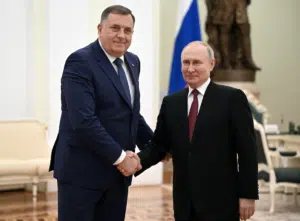Brussels – Not even the time to celebrate the European Council’s green light to start EU accession negotiations, and Bosnia and Herzegovina is once again in the midst of a political storm. ” the High Representative has acknowledged the need to intervene, having in mind the lack of capability or will among domestic authorities to remedy serious shortcomings in the election process,” is how the High Representative for Bosnia and Herzegovina, Christian Schmidt, presented the decision of amending the electoral law. An act that saw a cold reception in Brussels, which would have preferred a more institutional process, and that is already risking new tensions in the region.

“We are approaching another election [the October 6 local elections, ed.], but authorities in Bosnia and Herzegovina have not addressed numerous problems, concerns, and questions that arose in previous election cycles,” is the frontal attack that came yesterday afternoon (March 26) from the authority established to oversee the implementation of the 1995 Dayton Accords (which ended the war in Bosnia that began three years earlier). To ensure Bosnian voters “equal opportunity to participate in elections” and transparency throughout the electoral process — one of the most complicated in the world — High Representative Schmidt presented a package of measures to amend the electoral law. This possibility stems from the so-called ‘Bonn powers’ – provided for in the Dayton Accords – which allow the High Representative to impose legislative measures or dismiss officials who oppose the implementation of peace accords.
The 114-article reform package -expected to “gradually” be introduced as early as in local elections this year in selected pilot areas and then in the 2026 legislative elections – provides for more oversight on voting and counting, more transparency in voter registration (especially absentee, refugee, and data vetting), and security “from start to finish” of the voting process. This includes thorough electronic voter identification, video surveillance, and electronic ballot counting. In particular, Article 5 stands out: “No person who has been convicted by any international or domestic court of the crime of genocide, crimes against humanity or war crimes may stand as candidate for elections or hold any elective, appointive or other office.” There is also a more clearly defined protection of human and civil rights and measures to prevent voter manipulation, including those against fake news.

From left: Srpska Republic President Milorad Dodik and Serbian President Aleksandar Vučić (credits: Andrej Isakovic / Afp)
Schmidt presented the “electoral integrity” package, calling it his “contribution” to Bosnia and Herzegovina’s path towards the European Union. However, from Brussels, the response was not particularly warm: “The EU recalls that his executive powers should be used only as a measure of last resort against irreparable unlawful acts,” said the European External Action Service (EEAS) spokesman, Peter Stano. The biggest perplexity is that there has already been “a strong preference for the BiH Parliament to take its responsibility and adopt these reforms,” but also that “extensive international supervision is incompatible with the European future” of the Balkan country. What is really worrying, however, is the reaction of Bosnia and Herzegovina’s Serb-majority entity, Republika Srpska, and that of its closest ally in the region, Serbia. “Schmidt has nothing to do with the electoral process. We have already said what measures we will take,” the president of Republika Srpska Milorad Dodik warned, with Serbian President Aleksandar Vučić adding that this news “directly threatens our vital national interests, both of Serbia and Republika Srpska.”
The Republika Srpska problem
Dodik is one of the biggest obstacles to Bosnia and Herzegovina’s path to rapprochement with the European Union since he has been promoting a secessionist project since October 2021. The goal is to remove the region from central state control in such crucial areas as the army, tax system, and judiciary, more than 20 years after the end of the ethnic war in Bosnia and Herzegovina. The European Parliament has evoked economic sanctions, and after the condemnation of secessionist attempts by the Serb-majority entity in Bosnia (with a bill to establish an autonomous High Judicial Council), Bosnian leaders gathered in Brussels in mid-June 2022 to initiate a paper for stability and peace, focused primarily on electoral and constitutional reforms in the Balkan country.

From left: Republika Srpska President Milorad Dodik and Russian autocrat Vladimir Putin, at the Kremlin on May 23, 2023 (credits: Alexey Filippov / Sputnik / Afp)
But concerns have become increasingly real since late March 2023, when the government of the Bosnian Serb entity ha presentato a draft law to establish a registry of foreign-funded associations and foundations.The called law on ‘foreign agents’is similar to the one adopted by Moscow in December 2022 and was approved in late September by theNational Assembly in Banja Luka,##§##. In parallel, the process of adopting amendments to the Criminal Code reintroducing criminal penalties for defamation has also advanced. Following the proposal-also in late March-the entry into force is dated Aug. 18, and now provides for fines of 5,000 to 20,000 Bosnian marks (2,550 to 10,200 euros) if the defamation occurs “through the press, radio, television, or other public media, during a public meeting, or otherwise.” The European External Action Service (EEAS) and the EU delegation in Sarajevo attacked Banja Luka, highlighting that the two laws “have ahad a frightening effect on freedom of speech in Republika Srpska.”
The secessionist provocations go hand-in-hand with the relationship with Russia post-Ukrainian invasion. As early as September 20, 2022, Dodik traveled to Moscow for a bilateral meeting with Putin after openly provoking Western partners about the illegal annexation of Russian-occupied Ukrainian regions. Provocations that continued at the beginning of January 2023 with the award to the Russian autocrat of the Order of Republika Srpska (the highest honor of the Serb-majority entity in the Balkan country) – in recognition of “patriotic concern and love” toward Banja Luka’s demands – on the occasion of the National Day of Republika Srpska, an unconstitutional holiday under Bosnian law. As if that were enough, on May 23, 2023, while in Brussels, misgivings emerged about the Union’s failure to respond with sanctions, Dodik went on a second trip to Moscow. EU sources revealed to Eunews that a framework of restrictive measures has existed for some time now ready to be implemented, but Viktor Orbán’s Hungary does not allow the green light. Any such foreign policy action requires unanimity in the Council.
Bosnia and Herzegovina’s EU accession path
Bosnia and Herzegovina’s journey towards the European Union began on February 15, 2016, with the official submission of its membership application. For more than six years, EU institutions did not give a positive response because of the difficulty in implementing the 14 base conditions (Copenhagen criteria) to be considered a formal candidate. Since the outbreak of war in Ukraine -given the risks of Russian destabilization in the country and the region – work in Brussels and Sarajevo has intensified for rapprochement. The 2022 Enlargement Package recommended granting Bosnia and Herzegovina candidate status for EU membership. Shortly after, on December 15, 2022, the heads of State and Government gave the green light.
After becoming the eighth candidate country for accession in the EU enlargement process, Bosnia and Herzegovina has continued to pursue its path toward the Union. Thanks to (albeit limited) progress made by Brussels, the EU Commission decided to include in the 2023 Enlargement Package a recommendation to start accession negotiations for Sarajevo “once the necessary degree of compliance with the accession criteria has been achieved.”The European Council, on December 14, 2023, endorsed the recommendation until the historic day for the country last week. After receiving from the von der Leyen Cabinet the indication that Sarajevo is finally ready -and under the push of seven particularly open-minded countries, including Italy – Thursday (March 21), the European Council decided to start EU accession negotiations with Bosnia and Herzegovina. The EU Commission will prepare the negotiating framework “when all relevant steps are taken” by the partner country, after which it must be adopted unanimously in the General Affairs Council (which brings together the 27 ministers of European Affairs). Only then will the EU accession negotiations for Bosnia and Herzegovina really be launched at the formal level.
Find more insights on the Balkan region in the BarBalkans newsletter hosted by Eunews
English version by the Translation Service of Withub




